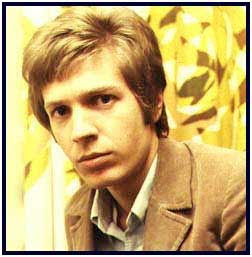This series of seminal albums by Scott Engel came as a shock at the time.
Imagine one of those retards from Boyzone creating a solo LP like Dylan's "Desire" ... and you're in the ballpark!
These wonderful albums are a galaxy away from the Walker Brothers!
However, they never sold at the time and it wasn't until much later that accumulated critical opinion put these great albums back on the map!
These albums a must have for true fans of music!
Truly wonderful!
Scott Walker shed the Walker Brothers' mantle and began a solo career in a style clearly glimpsed in Images, the Walkers' last album. To this he added risqué recordings of Jacques Brel songs, translated by Mort Shuman (who was also responsible for the hit musical Jacques Brel is Alive and Well and Living in Paris). The influence of Brel is important as regards Walker's songwriting but should not be over-stated. His vocal style remained consistent throughout this period.
Walker's own original songs of this period were clearly influenced by Brel as he explored European musical roots while expressing his own American experience. He was also reaching a new maturity as a recording artist.
In 1968 Walker threw himself into intense study of contemporary and classical music, which included a sojourn in Quarr Abbey, a monastery on the Isle of Wight, to study Gregorian chant. His own songs gradually course into Lieder and classical musical modes.
Scott Walker's early solo career was successful in Britain; his first three albums, titled Scott (1967), Scott 2 (1968) and Scott 3 (1969) all sold in large numbers, Scott 2 topping the British charts. There were also early indications that this concentrated attention was not conducive to his emotional well being. He became reclusive and somewhat distanced from his audience. During this time, he combined his earlier teen appeal with a darker, more idiosyncratic approach hinted at in songs like Orpheus on the Images album. Walker drove a fine line between classic ballads, his own compositions and Brel covers, all delivered inimitably.
At the peak of his fame in 1969, he was given his own BBC TV series, Scott, featuring solo Walker performances of ballads, big band standards and introductions of his own and Brel compositions. Footage of the show is currently very rare as recordings were not archived. Walker's fourth solo album was an LP of songs from the TV series entitled Scott: Scott Walker Sings Songs from his TV Series.
Walker released his fifth solo LP, Scott 4, in 1969. This was his first to be made up entirely of self-penned material. The 'standards' and Brel were gone and the sound was pared down. The album failed to chart and was deleted soon after. It has been speculated that the decision to release the album under the name "Noel Scott Engel" rather than his stage name contributed to its chart failure.
In recent interviews, Walker has suggested that by his third solo LP, a self-indulgent complacency had crept into his choice of material. Starting with 'Til The Band Comes In (1970), the early 70s saw Walker revert to cover versions of popular film tunes and a serious flirtation with the country and western scene. Walker regards these as his lost years as an artist, though others claim the albums of this time are underrated and in fact contain several near-definitive readings of classic songs. The Moviegoer (1972), Any Day Now (1973), Stretch (1973), and We Had It All (1974) feature no original material whatsoever.
Scott Walker's early solo career was successful in Britain; his first three albums, titled Scott (1967), Scott 2 (1968) and Scott 3 (1969) all sold in large numbers, Scott 2 topping the British charts.
There were also early indications that this concentrated attention was not conducive to his emotional well being. He became reclusive and somewhat distanced from his audience. During this time, he combined his earlier teen appeal with a darker, more idiosyncratic approach.
Walker drove a fine line between classic ballads, his own compositions and Brel covers, all delivered inimitably.













